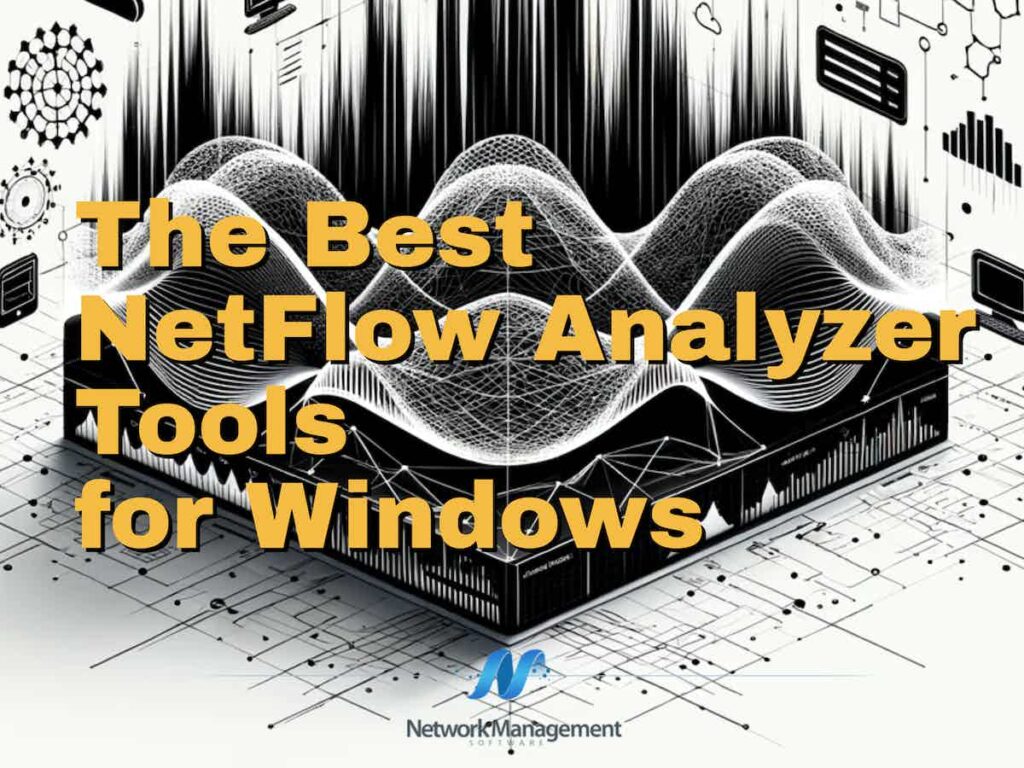
If you’ve ever experienced the frustration of trying to identify exactly which workstation is clogging up your network with torrent downloads, then examining NetFlow data on your network could help you out.
NetFlow Analyzers & Collectors can help admins find out exactly what kind of traffic is on the network, and who is consuming all your precious bandwidth.
We’ve pulled together a few free tools that collect and analyze NetFlow data. We’ve tried to find tools that are truly free, and not just time-limited evaluation versions.
Here is our list of the top NetFlow Analyzers:
- ManageEngine NetFlow Analyzer – FREE TRIAL This paid tool has a free trial and also a limited free version. It extracts traffic data from switches and routers. Available for Windows Server and Linux. Start a 30-day free trial.
- Paessler PRTG – FREE TRIAL This package of network, server, and application monitors is a paid system but you can get it for free if you only activate 100 of the sensors. Runs on Windows Server. Get a 30-day free trial.
- Noction Flow Analyzer A package of network monitoring and management tools that uses NetFlow and similar protocols to gather traffic flow information from switches and routers. Runs on Linux.
- ntopNG A free, open-source network monitoring service that operates through packet captures taken by libpcap and then filtered through NetFlow and sFlow. Runs on Windows, Linux, Unix, and macOS.
- SolarWinds NetFlow Traffic Analyzer This package extracts traffic capacity and utilization data from switches and routers, using NetFlow and similar statistical protocols, implementing alerts for traffic problems. Runs on Windows Server.
Though not time-limited, most of the tools are feature-limited versions of products from the software makers. Don’t let that discourage you though. All of these software packages are well worth downloading, even with the limitations.
But before we get to the tools, a brief overview of NetFlow is in order.
What is NetFlow/J-Flow/sFlow?
NetFlow data is generated by network devices like routers and firewalls. Flow data will generally contain details like source and destination IP addresses, port numbers, protocols, and more.
The term “NetFlow” is proprietary to Cisco, but other vendors have their own versions of “Flow.” For instance, Juniper calls it “J-Flow”, and several vendors, including HP and Fortinet, use “sFlow.”
Implementation details vary from vendor to vendor, but most flavors of xFlow produce the same sort of data. In this article, we’ll refer to all xFlow variants as NetFlow to keep things simple, but be aware that not all tools support the same flavors of Flow.
How to Enable NetFlow
Before you can use one of the free flow analyzers, NetFlow must be enabled on the devices you want to monitor. Don’t worry, it’s not hard. The steps to enabling NetFlow vary from device to device and there’s a wealth of information on the web to get you started.
For Cisco devices, start with the Cisco Netflow Configuration Guide.
Other vendors, like Juniper, usually have their own configuration resources too.
And, most of the vendors below have much more concise sets of instructions – for instance, SolarWinds, ManageEngine, and PRTG all have useful guides to help you out.
Now, on to the free tools!
The Best Free Netflow Analyzers & Collectors of 2024:
Our methodology for selecting NetFlow analyzer tools and software
We reviewed various NetFlow analyzer tools and analyzed the options based on the following criteria:
- Support for various Flow types
- Alerting and reporting capabilities
- Ability to schedule and automate Netflow tasks
- A facility to analyze Netflows over time
- Graphical interpretation of data, such as charts and graphs
- A free trial period, a demo, or a money-back guarantee for no-risk assessment
- A good price that reflects value for money when compared to the functions offered
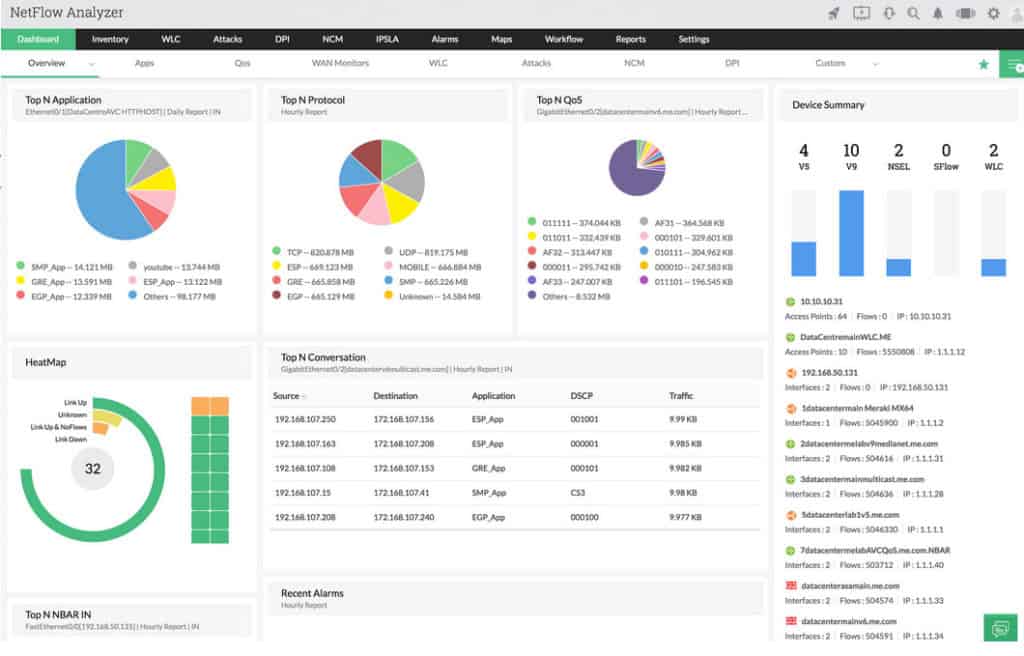
ManageEngine NetFlow Analyzer displays detailed source/destination data, as well as ports used, and applications detected. It also generates helpful charts that make it easy to visualize the data.
Why do we recommend it?
ManageEngine NetFlow Analyzer is an impressive package of traffic tracking systems. The tool gives you a packet sniffer, a protocol analyzer, and flow systems, including NetFlow, IPFIX, sFlow, and J-Flow. Use this tool to identify overloaded switches and improve performance through traffic shaping. Free for tracking two interfaces.
Limitations: Monitors only two interfaces. But, for the first 30 days, it can monitor unlimited interfaces.
Who is it recommended for?
The free version of this package is very limited and there aren’t many businesses that are small enough to get by with it. So, most companies are going to access the 30-day free trial of the full version, which you will have to pay for at the end of that period. The base package covers 10 interfaces.
Pros:
- Supports multiple protocols like NetFlow, great for monitoring Cisco equipment
- Both tools work well alongside each other to help view traffic patterns and bandwidth usage
- Easy-to-use interface automatically highlights bandwidth hogs and other network traffic outliers
- Scale well, designed for large enterprise networks
- Can view traffic on a per-hop basis, allowing for granular traffic analysis
Cons:
- Built for enterprise use, not designed for small home networks
Download the 30-day free trial.
ManageEngine NetFlow Analyzer
Start a 30-day FREE Trial

Paessler PRTG is a full network monitoring system. The free version includes a NetFlow sensor, in addition to many other features like reporting, alarming, and SNMP monitoring. The free version can monitor up to 10 sensors at no cost. Paessler also makes some useful NetFlow testing tools available, like the NetFlow Tester, and NetFlow Generator.
Why do we recommend it?
Paessler PRTG is a customizable package. Every customer gets the full bundle of tools and then decides which to switch on. Features within the pack include network discovery. NetFlow, sFlow, IPFIX, and J-Flow capabilities, and constant device checks with SNMP. Use this package to focus on traffic issues.
Limitations: Limited to 10 sensors (or 20 if you display the PRTG graphic on your website)
Who is it recommended for?
If you only activate 100 sensors in the PRTG pack, you don’t ever have to pay for the software. PRTG is available as a software package for Windows Server and also as a cloud-based SaaS package. Use it to test internet links as well as traffic flows on your network.
Pros:
- Uses a combination of packet sniffing, WMI, and SNMP to report network performance as well as discover new devices
- Autodiscovery reflects the latest inventory changes almost instantaneously
- Drag and drop editor makes it easy to build custom views and reports
- Supports a wide range of alert mediums such as SMS, email, and third-party integration
- Supports a freeware version
Cons:
- Is a very comprehensive platform with many features and moving parts that require time to learn
You can start with a 30-day free trial. Using up to 100 sensors is always free.
Paessler PRTG
Start a 30-day FREE Trial
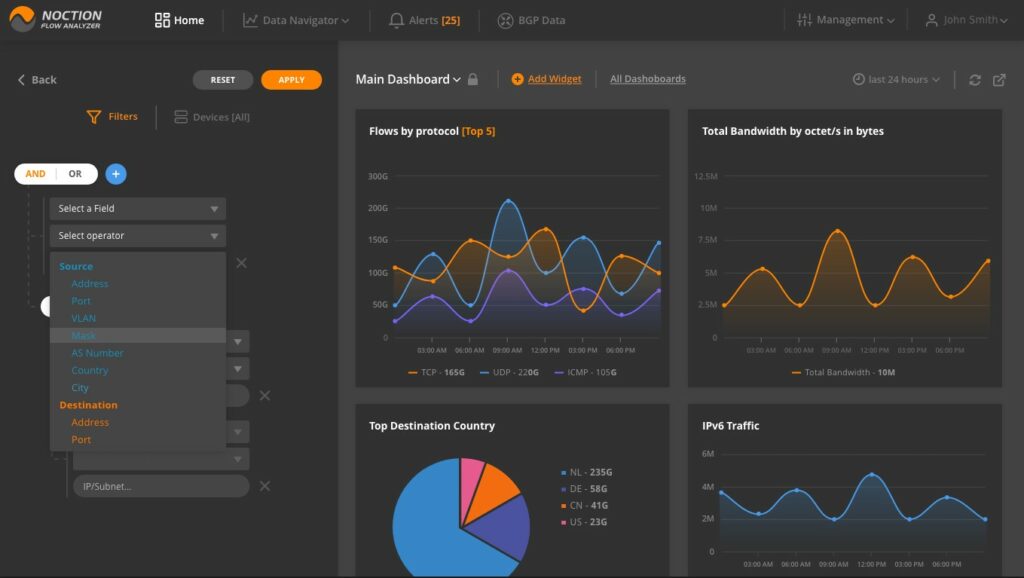
Noction Flow Analyzer is a powerful network traffic monitoring platform. The traffic monitoring part of this package relies on NetFlow and similar statistics gathering protocols to gather live traffic data from switches and routers.
Why do we recommend it?
Noction Flow Analyzer isn’t free forever, but you can use it for free for 30 days on the trial. This system focuses on traffic flow analysis to identify bottlenecks and overloaded devices. Use this information to upgrade your hardware capacity or squeeze extra capacity out of your existing system through traffic shaping.
The traffic monitor is able to communicate with network devices provided by a long list of manufacturers. This is because, as well as NetFlow, Noction can communicate with sFlow, J-Flow, NetStream, and IPFIX. There is also the BGP traffic monitoring feature available with this tool. Use it to monitor traffic volume distribution by different paths, optimize your peering strategy, and more. Noction installs on Linux and it is available for a free trial.
Who is it recommended for?
This package is rather pricey, so once the free trial period is over, it is unlikely that small businesses will continue with it. The company levies one free per site, so very large businesses will get the best value out of the package. An add-on unit provides analysis for external traffic.
Pros:
- Does an excellent job at creating insights and statistics from network information gathered
- Best suited for Linux environments
- Offers Juniper-specific templates
Cons:
- Site24x7 is a feature-dense platform that can take time to fully learn all of its features and customization options
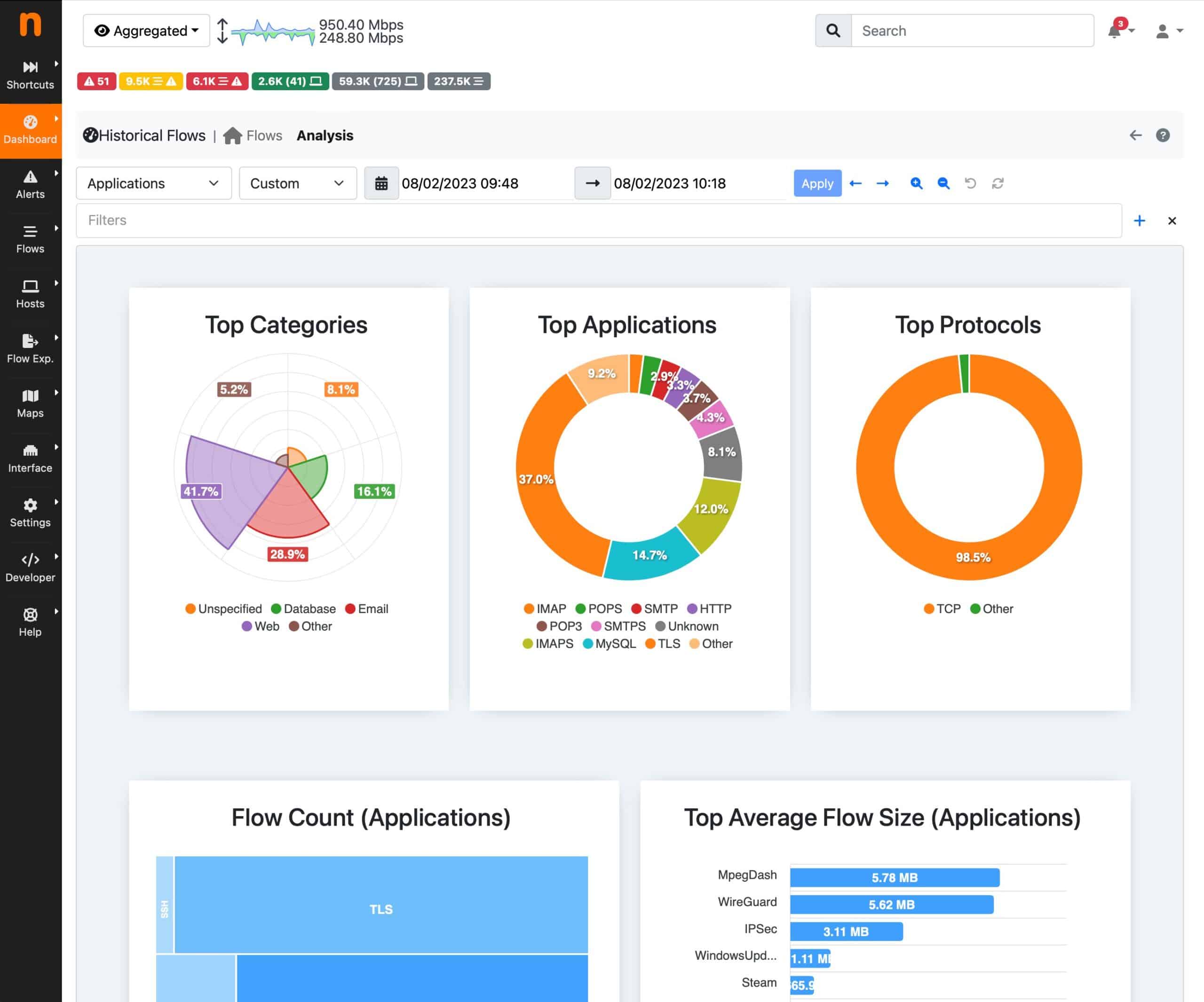
“ntopNG” is an open-source NetFlow analyzer and packet capture product. It took a little more effort to get up and running than some of the other software, but is a great open-source alternative. The data is analyzed and presented clearly and logically, even though it doesn’t have all the visual bells and whistles of some other products.
Why do we recommend it?
If you are looking for a truly free forever network analyzer with NetFlow capabilities, then ntopNG is your best bet. This is a packet capture tool as well and it can also gather SNMP data from network devices. So, this system gives you three channels for acquiring packet data and it can also analyze and display traffic statistics.
Limitations: None if you download and compile it yourself – source code can be compiled on Linux or Windows. But if you want an executable binary file, then you’re limited to capturing 2000 packets, unless you register (erm, donate).
Who is it recommended for?
The free ntopNG is one tier in the product list of ntop. You will also see paid versions available, called ntopNG Pro and ntopNG Enterprise. As you would expect, those paid systems give you more features than the free option. You can run ntopNG on Windows, Linux, Unix, macOS, and RaspbianOS.
Pros:
- Extremely lightweight tool
- Supports IPv6
- Combines flows so you have a holistic view of your data
Cons:
- Almost no visualization features
Click here to download ntopNG.
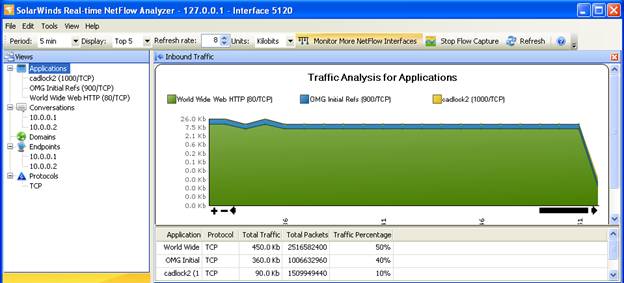
The SolarWinds NetFlow Traffic Analyzer is another great tool from a company with a history of making reliable network monitoring software. Data can be sorted, displayed, and charted in different ways – such as conversations, and endpoints.
Why do we recommend it?
SolarWinds NetFlow Traffic Analyzer dovetails with the SolarWinds Network Performance Monitor to give you constant traffic tracking across your network alongside device health checks. Jitter and lost packets are frequently due to faulty or overloaded switches and routers, so examining device statuses provides you with immediate solutions for your traffic problems.
Limitations: Monitor only a single NetFlow interface, and keeps 60 minutes worth of data.
Who is it recommended for?
This package is a solution for large businesses with complicated networks. If you implement VLANs or run VoIP or video conferencing over your network, you will need to implement traffic shaping measures and ensure that your switches are in tip-top condition. This software runs on Windows Server.
Pros:
- Completely free bundle of tools
- Great for testing Cisco equipment and troubleshooting NetFlow messaging
- Can test networks with simulated traffic prior to going live
- Allows you to replay specific traffic patterns to replicate errors
Cons:
- Is a highly specialized suite of tools designed for network professionals, not designed for non-technical users
Conclusion
We tried out all of these products and were impressed by each and every one. If you’re looking for a way to manage your bandwidth more efficiently, then enable NetFlow on your network and download one of these analyzers.
It’s worth it even if only to have a close peek into what kind of data really is flowing over your network.
NetFlow Analyzer Tools for Windows FAQs
What are the benefits of using NetFlow Analyzer?
NetFlow Analyzer helps network administrators to monitor and optimize network performance, detect and troubleshoot security threats, and reduce network downtime.
What types of devices can be used with NetFlow Analyzer?
NetFlow Analyzer can be used with any device that supports NetFlow or sFlow protocols, including routers, switches, and firewalls.
What types of reports can be generated with NetFlow Analyzer?
NetFlow Analyzer can generate a variety of reports, including top talkers, top protocols, top applications, and network usage by user.
What is a flow in NetFlow Analyzer?
A flow is a unidirectional sequence of packets between a source and destination IP address that share common characteristics, such as protocol and port number.
How does NetFlow Analyzer help with security monitoring?
NetFlow Analyzer can identify security threats by analyzing network traffic data and detecting anomalies, such as unusual traffic patterns or communication with known malicious IP addresses.
How can NetFlow Analyzer help with bandwidth management?
NetFlow Analyzer can help with bandwidth management by providing insights into network traffic patterns and identifying bandwidth-intensive applications or users.
What is a NetFlow version?
NetFlow version refers to the specific version of the NetFlow protocol being used, with newer versions providing additional features and capabilities.
What is the difference between NetFlow v5 and NetFlow v9?
NetFlow v9 provides more detailed traffic data than NetFlow v5, including support for IPv6 and user-defined fields.

Our website relies on funding from our readers, and we may receive a commission when you make a purchase through the links on our site.
The Best Free NetFlow Analyzer Tools for Windows
by Aaron Leskiw, CCDA, CCNA, MCSE, ITILv3, MCSA, A+ - Last Updated: May 29, 2024
If you’ve ever experienced the frustration of trying to identify exactly which workstation is clogging up your network with torrent downloads, then examining NetFlow data on your network could help you out.
NetFlow Analyzers & Collectors can help admins find out exactly what kind of traffic is on the network, and who is consuming all your precious bandwidth.
We’ve pulled together a few free tools that collect and analyze NetFlow data. We’ve tried to find tools that are truly free, and not just time-limited evaluation versions.
Here is our list of the top NetFlow Analyzers:
Though not time-limited, most of the tools are feature-limited versions of products from the software makers. Don’t let that discourage you though. All of these software packages are well worth downloading, even with the limitations.
But before we get to the tools, a brief overview of NetFlow is in order.
What is NetFlow/J-Flow/sFlow?
NetFlow data is generated by network devices like routers and firewalls. Flow data will generally contain details like source and destination IP addresses, port numbers, protocols, and more.
The term “NetFlow” is proprietary to Cisco, but other vendors have their own versions of “Flow.” For instance, Juniper calls it “J-Flow”, and several vendors, including HP and Fortinet, use “sFlow.”
Implementation details vary from vendor to vendor, but most flavors of xFlow produce the same sort of data. In this article, we’ll refer to all xFlow variants as NetFlow to keep things simple, but be aware that not all tools support the same flavors of Flow.
How to Enable NetFlow
Before you can use one of the free flow analyzers, NetFlow must be enabled on the devices you want to monitor. Don’t worry, it’s not hard. The steps to enabling NetFlow vary from device to device and there’s a wealth of information on the web to get you started.
For Cisco devices, start with the Cisco Netflow Configuration Guide.
Other vendors, like Juniper, usually have their own configuration resources too.
And, most of the vendors below have much more concise sets of instructions – for instance, SolarWinds, ManageEngine, and PRTG all have useful guides to help you out.
Now, on to the free tools!
The Best Free Netflow Analyzers & Collectors of 2024:
Our methodology for selecting NetFlow analyzer tools and software
We reviewed various NetFlow analyzer tools and analyzed the options based on the following criteria:
1. ManageEngine NetFlow Analyzer – FREE TRIAL
ManageEngine NetFlow Analyzer displays detailed source/destination data, as well as ports used, and applications detected. It also generates helpful charts that make it easy to visualize the data.
Why do we recommend it?
ManageEngine NetFlow Analyzer is an impressive package of traffic tracking systems. The tool gives you a packet sniffer, a protocol analyzer, and flow systems, including NetFlow, IPFIX, sFlow, and J-Flow. Use this tool to identify overloaded switches and improve performance through traffic shaping. Free for tracking two interfaces.
Limitations: Monitors only two interfaces. But, for the first 30 days, it can monitor unlimited interfaces.
Who is it recommended for?
The free version of this package is very limited and there aren’t many businesses that are small enough to get by with it. So, most companies are going to access the 30-day free trial of the full version, which you will have to pay for at the end of that period. The base package covers 10 interfaces.
Pros:
Cons:
Download the 30-day free trial.
ManageEngine NetFlow Analyzer Start a 30-day FREE Trial
2. Paessler PRTG – FREE TRIAL
Paessler PRTG is a full network monitoring system. The free version includes a NetFlow sensor, in addition to many other features like reporting, alarming, and SNMP monitoring. The free version can monitor up to 10 sensors at no cost. Paessler also makes some useful NetFlow testing tools available, like the NetFlow Tester, and NetFlow Generator.
Why do we recommend it?
Paessler PRTG is a customizable package. Every customer gets the full bundle of tools and then decides which to switch on. Features within the pack include network discovery. NetFlow, sFlow, IPFIX, and J-Flow capabilities, and constant device checks with SNMP. Use this package to focus on traffic issues.
Limitations: Limited to 10 sensors (or 20 if you display the PRTG graphic on your website)
Who is it recommended for?
If you only activate 100 sensors in the PRTG pack, you don’t ever have to pay for the software. PRTG is available as a software package for Windows Server and also as a cloud-based SaaS package. Use it to test internet links as well as traffic flows on your network.
Pros:
Cons:
You can start with a 30-day free trial. Using up to 100 sensors is always free.
Paessler PRTG Start a 30-day FREE Trial
3. Noction Flow Analyzer
Noction Flow Analyzer is a powerful network traffic monitoring platform. The traffic monitoring part of this package relies on NetFlow and similar statistics gathering protocols to gather live traffic data from switches and routers.
Why do we recommend it?
Noction Flow Analyzer isn’t free forever, but you can use it for free for 30 days on the trial. This system focuses on traffic flow analysis to identify bottlenecks and overloaded devices. Use this information to upgrade your hardware capacity or squeeze extra capacity out of your existing system through traffic shaping.
The traffic monitor is able to communicate with network devices provided by a long list of manufacturers. This is because, as well as NetFlow, Noction can communicate with sFlow, J-Flow, NetStream, and IPFIX. There is also the BGP traffic monitoring feature available with this tool. Use it to monitor traffic volume distribution by different paths, optimize your peering strategy, and more. Noction installs on Linux and it is available for a free trial.
Who is it recommended for?
This package is rather pricey, so once the free trial period is over, it is unlikely that small businesses will continue with it. The company levies one free per site, so very large businesses will get the best value out of the package. An add-on unit provides analysis for external traffic.
Pros:
Cons:
4. ntopNG
“ntopNG” is an open-source NetFlow analyzer and packet capture product. It took a little more effort to get up and running than some of the other software, but is a great open-source alternative. The data is analyzed and presented clearly and logically, even though it doesn’t have all the visual bells and whistles of some other products.
Why do we recommend it?
If you are looking for a truly free forever network analyzer with NetFlow capabilities, then ntopNG is your best bet. This is a packet capture tool as well and it can also gather SNMP data from network devices. So, this system gives you three channels for acquiring packet data and it can also analyze and display traffic statistics.
Limitations: None if you download and compile it yourself – source code can be compiled on Linux or Windows. But if you want an executable binary file, then you’re limited to capturing 2000 packets, unless you register (erm, donate).
Who is it recommended for?
The free ntopNG is one tier in the product list of ntop. You will also see paid versions available, called ntopNG Pro and ntopNG Enterprise. As you would expect, those paid systems give you more features than the free option. You can run ntopNG on Windows, Linux, Unix, macOS, and RaspbianOS.
Pros:
Cons:
Click here to download ntopNG.
5. SolarWinds NetFlow Traffic Analyzer
The SolarWinds NetFlow Traffic Analyzer is another great tool from a company with a history of making reliable network monitoring software. Data can be sorted, displayed, and charted in different ways – such as conversations, and endpoints.
Why do we recommend it?
SolarWinds NetFlow Traffic Analyzer dovetails with the SolarWinds Network Performance Monitor to give you constant traffic tracking across your network alongside device health checks. Jitter and lost packets are frequently due to faulty or overloaded switches and routers, so examining device statuses provides you with immediate solutions for your traffic problems.
Limitations: Monitor only a single NetFlow interface, and keeps 60 minutes worth of data.
Who is it recommended for?
This package is a solution for large businesses with complicated networks. If you implement VLANs or run VoIP or video conferencing over your network, you will need to implement traffic shaping measures and ensure that your switches are in tip-top condition. This software runs on Windows Server.
Pros:
Cons:
Conclusion
We tried out all of these products and were impressed by each and every one. If you’re looking for a way to manage your bandwidth more efficiently, then enable NetFlow on your network and download one of these analyzers.
It’s worth it even if only to have a close peek into what kind of data really is flowing over your network.
NetFlow Analyzer Tools for Windows FAQs
What are the benefits of using NetFlow Analyzer?
NetFlow Analyzer helps network administrators to monitor and optimize network performance, detect and troubleshoot security threats, and reduce network downtime.
What types of devices can be used with NetFlow Analyzer?
NetFlow Analyzer can be used with any device that supports NetFlow or sFlow protocols, including routers, switches, and firewalls.
What types of reports can be generated with NetFlow Analyzer?
NetFlow Analyzer can generate a variety of reports, including top talkers, top protocols, top applications, and network usage by user.
What is a flow in NetFlow Analyzer?
A flow is a unidirectional sequence of packets between a source and destination IP address that share common characteristics, such as protocol and port number.
How does NetFlow Analyzer help with security monitoring?
NetFlow Analyzer can identify security threats by analyzing network traffic data and detecting anomalies, such as unusual traffic patterns or communication with known malicious IP addresses.
How can NetFlow Analyzer help with bandwidth management?
NetFlow Analyzer can help with bandwidth management by providing insights into network traffic patterns and identifying bandwidth-intensive applications or users.
What is a NetFlow version?
NetFlow version refers to the specific version of the NetFlow protocol being used, with newer versions providing additional features and capabilities.
What is the difference between NetFlow v5 and NetFlow v9?
NetFlow v9 provides more detailed traffic data than NetFlow v5, including support for IPv6 and user-defined fields.